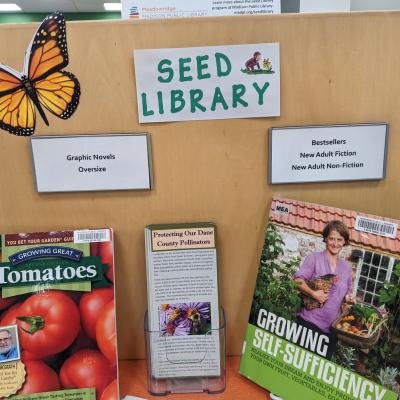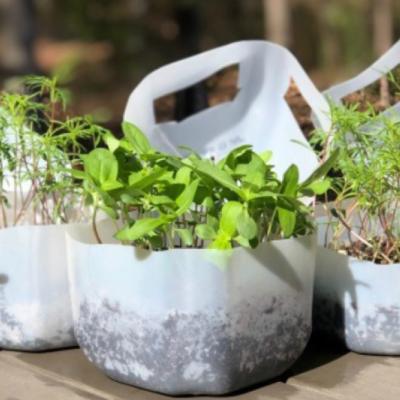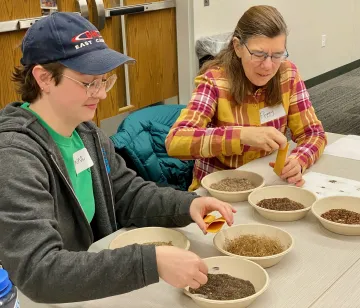
Madison Public Library's Seed Library includes two FREE seed giveaways throughout the year - the native Wisconsin seed giveaway, which typically takes place in December or January and the Garden Seed giveaway, which begins in early March. Each of these seed giveaways are free and library visitors are not required to have a library card to take and enjoy seeds. In addition to seeds, we also offer several accompanying gardening classes and additional resources to support your growth! The seed library helps create a culture of sharing and community, and saving seeds leads to a sustainable future for both your community and your garden.

How do I get seeds?
Borrowing seeds from Madison Public Library is free and easy!
- Visit participating libraries to pick up seeds.
- Grow your plants and enjoy the harvest.
- After harvest, collect and share seeds with neighbors if you'd like!
No library card is needed. Please note, just like with our books, there are a limited number of seeds in the collection, so only take as many seed packets as you will use.
Participating Libraries:
- Alicia Ashman Library
- Goodman South Library
- Hawthorne Library
- Lakeview Library
- Meadowridge Library
- Monroe Street Library
- Pinney Library (Out of Garden Seeds as of 04/10/25)
- Sequoya Library

In 2024, Madison Public Library's Seed Library nearly doubled in size, giving away 46,920 seed packets.

Madison Public Library visitors can pick up flower, herb, and produce seeds from eight locations during select times of year.

Go beyond seeds with tips on growing your garden thanks to book lists for all ages, book displays, and gardening classes!
Available March 3 and while supplies last

The garden seed giveaway offers a variety of vegetable, herb, fruit, and flower seeds beginning in March while supplies last. We begin giving away seeds in March so that growers have 8 weeks before to the last frost to start preparing their gardens and begin starting some of the earlier plants indoors prior to moving them outdoors for full planting.
Thanks to the help of many volunteers, we package more than 45,000 packets of seeds to give away each Spring. In 2025, we'll have approximately 50 different species of seeds available and each year we modify our ordering based on both public feedback and observation. For instance, flowers and herbs are always very popular across locations, and we upped the amount that we'll have available of each of those this year.
Each packet contains 10-15 seeds apiece and can be put to use in your garden at home or in a community garden plot around town. As part of the Seed Library, we've also planned a great lineup of gardening programs that will take place throughout the year. Get supportive instruction or learn different techniques to utilize the new seeds you pick up at the library. Plus, you can contribute to the continued success of the Seed Library program by helping us package seeds - volunteer events will continue to be available through early April.
Note: The Seed Library is very popular. Please keep an eye on the participating locations section above to see which libraries still have seeds available, as we'll be updating that section as seeds run out. Thank you!

More than 5,400 native Wisconsin seed packets were distributed at Madison Libraries in 2024

Native Wisconsin plant seeds are best sown in fall to midwinter, and left to overwinter.

Stop into any of the eight participating Madison Public Library locations to pick up seeds during select times.
Available January - March (currently out of seeds at all locations)

Each winter, Madison Public Library offers a limited supply of native Wisconsin seeds. Because native Wisconsin plant seeds are best sown in fall to midwinter, and left to overwinter, this giveaway typically takes place in December or January.
We partner with the Dane County Land & Water Resources Department for the past several years; they donate a limited variety of native plant seeds collected by Dane County Parks volunteers and we host several volunteer seed packaging events in order to prepare seeds to be given away in our library locations. Common seed varieties for this giveaway include black-eyed susan, wild bergamot, butterfly weed, bottlebrush grass, and more.
“Native plants are adapted to the local climate and soils, are drought tolerant, disease resistant, and have deep root systems that help infiltrate rain water. Once established, native plants are aesthetically pleasing and require little watering, fertilizing and mowing … They also provide important ecosystem services such as improved water quality and habitat and food for local wildlife, including numerous pollinator species.”
(Dane County Land & Water Resources Department)
Upcoming Events
Sequoya Library
- May14-Meeting Rooms A and B Combined
Alicia Ashman Library
- May31-Community Room
Lakeview Library
- May17-Community Room - Fireplace Side
Additional Resources
There are several great resources at the library for gardeners! Sign up for free gardening classes available from Madison Public Library year-round, attend a Naturalist-in-Residence event during the summer, or access a wealth of information through our book lists.
- Gardening Books
- Naturalist-in-Residence
- Live Well @ Your Library
- Gardening Book List for Adults [DOWNLOAD]
- Recursos de jardinería para adultos [DOWNLOAD]
- Cov Ntaub Ntawv Hais Txog Kev Ua Vaj Rau Cov Neeg Laus [DOWNLOAD]
- Up We Grow! Gardening Books for Children [DOWNLOAD]
- ¡A crecer! Libros de jardinería para niños [DOWNLOAD]
- Sawv Los Peb Cog Zaub! Cov Phau Ntawv Ua Vaj rau Me Nyuam Yaus [DOWNLOAD]
- Sowing Native Seeds Over Winter Guide [DOWNLOAD]
Funding
Madison Public Library's Seed Library began as a larger project called the Dane County Seed Library, which was started in 2014 with a $5,000 grant provided by the John A. Johnson Fund and an anonymous donor through the Madison Community Foundation. The Seed Library is currently funded by multiple sources, including the Friends of Madison Public Library and Madison Public Library Foundation.


